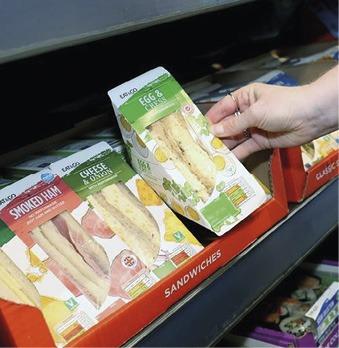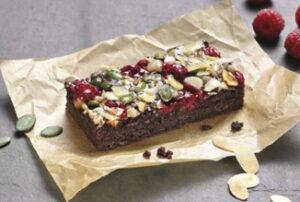Sometimes we have a main meal!
Snacking is gradually losing its snacking character, turning from a sometimes guilt-inducing habit into a conscious way of eating, replacing main meals quite often. Traditional meal times are eroding.
This article is available for reading in Trade magazin 2025/4.
As our lifestyles and work schedules are changing rapidly, meal times are less and less structured by the working day. Our eating habits are adapting to the rhythms of our daily lives, which is becoming faster, more flexible and more mobile. In this article we call everything that isn’t a main meal a snack. However, if you can’t define snacks by type of food, ingredients, processing or even portions, then one could say that everything is a snack – which is only a problem because it means that statistical data can’t be produced on snacks in general.

Let’s see some statistical data!
It is easier to calculate and compare data if we narrow the scope. For market research firm International those confectionery and sweet pastries, ice-creams, confectionery bars, sweet biscuits and savoury snacks qualify as snack that are available in commercial circulation. The company’s calculation is that the global market for these reached USD 655bn in 2023.
According to Euromonitor, the amount spent on such products in Hungary was HUF 640bn in the same year. In 2024 the domestic snack market showed demand for premium products, but reflecting the declining purchasing power, some of the demand shifted towards cheaper and private label brands. Thanks to the health consciousness trend, there was also a surge in demand for “better for you” options such as nuts, fruit and nut bars, vegetable and rice crisps and protein bars.
Snack it!
Although consumers are focusing more and more on healthy lifestyle, the demand for snacking is still strong and keeps growing! Three quarters of US consumers snack at least once a day and 56% of them substitute their traditional meals with snacks most of the time. The snack market is adapting to changing consumer and regulatory expectations, with unhealthy and unsustainable ingredients gradually disappearing and an increasingly creative variety of alternatives emerging.




Snacking is slowly turning into “small meals”
What else would you like?
The functional benefits of snacks are becoming more important. According to a US survey, 57% of consumers aged 25-44 say they eat snacks for the nutritional benefits. This means that products rich in protein, fibre and natural ingredients are conquering the hearts of consumers and there is a growing demand for pre-, pro- and postbiotics and adaptogens in snack ingredients.
Snacking
In the spirit of healthy self-indulgence a growing number of people are opting for smaller, quick-to-eat snacks instead of traditional meals – this growing global trend is known as snackification. Snacking is slowly evolving into “small meals”, which are slowly but steadily replacing traditional meals. In the food consumption culture of the future every food and drink could become a mini meal: snacking will be a new way of eating – a development that is already testing both the retail and catering industries. //
A complete meal

Dr. László Vereczkei
head of product development and
licensing
BioTechUSA
The snack market is changing fast and people are replacing their main meals with snacks. Due to the rapid pace of life, convenience and the need for instant nutrient intake, consumers are no longer having these products as supplements: they are looking at them as a complete meal. Shoppers want snacks that are high in protein and free from sugar, lactose and gluten, and fit their vegetarian or vegan diets. BioTechUSA is launching a new multi-layered protein bar this year, developed specifically for modern consumer needs. //
Attractive offering

Tibor Kovács
MD for food purchasing
Lidl
Lidl constantly monitors customer needs in all product categories – including snacks – and adjusts the assortment accordingly. In snacking we see a strong emphasis on the need for experience and self-reward in basically all target groups, regardless of age.
Feedback is that Lidl’s snack products stand out for their high quality, good prices and large selection. This particularly attractive offering is also reflected in sales: almost 40% of baskets contain this type of product.//.
Tried and tested

István Sebők
head of sales
Liza Snack
Liza Snack Kft.’s experience is that customers prefer the products they already know and like. Of course there is a certain openness to trying new products, but a large proportion return to the “good old” snack. Price is a priority and product ingredients are important only for those who are sensitive to something.
Vegetable-based, fibre-rich, high-protein products are on the rise, and typically they are gluten-free or vegan, with low salt, sugar and oil content. //
Light, crispy and fibre-rich

Zoltán Varga
business development manager
Abonett
Abonett crispy bread slices and sandwiches fit food trends very well: high in fibre and low in calories, they can be enjoyed at work, at school or on the go, as they are pre-packed and require no refrigeration or preparation. The products are made sustainably, from natural ingredients, without artificial additives, and they are marketed in environmentally friendly packaging.
Our gluten-free Abonett sandwiches feature delicious cream filled between two slices of Abonett bread. //
Youthful and dynamic trends

Attila Nagy
sales director
Auchan
Products with reduced fat and salt content that are high in protein and fibre have become more important. Some consumers are now looking for snacks that are free from artificial additives, preservatives and colours. We also try to keep up with youthful, dynamic trends, especially US and TikTok-inspired ones.
Auchan offers a wide range of snacks in line with these trends, characterised by high quality and affordable prices. Customers are open to trying new and exotic flavours from all over the world. //
Harmonising with the trends

Erhard Szabados
marketing manager
Mogyi
Trends can be divided into three main categories: functional benefits at product and packaging level, e.g. added protein or grab-and-go packaging; adaptability to healthy and special diets, such as the absence of artificial and/or animal-based ingredients or being gluten and lactose-free; and manufacturer efforts towards sustainability.
Mogyi strives to be a leader in all these, for instance our Vital Mix and Energy Mix products hits the shops in the first quarter of 2025. //
In tune with the consumer

Norbert Poór
national account manager
Corn&Joy
Today’s consumers are looking for healthier snacks made from natural ingredients, which are free from artificial additives and allergens. We believe it is important to keep up with changing consumption habits, as people are becoming more health-conscious.
Our Corn&Joy products are gluten-, soy- and palm oil free, and 95% of our assortment is TOP 14 allergen-free as well, so food intolerant consumers can enjoy them too. //
Premium, sustainable, affordable

PókeczAnna marketing manager
Cerbona
Modern consumers are searching for healthy snacks made from natural ingredients, often without added sugar and artifi cial additives. Value for money and sustainability aspects are also key. Shoppers are willing to pay extra for a premium, sustainably sourced product, but affordability is essential. Our muesli and oat bars fit modern eating habits very well. They are practical, easy to enjoy on the go and they are in line with the health trends.//
An impulse category

Márk Maczelka
head of communications
SPAR Magyarország
The snack category – and within this that of crisps – is expected to grow in 2025. One of the most important factors when buying crisps will continue to be related to pricing, and the fact that a significant proportion of customers prefer products made in Hungary is also decisive. This is an impulse category: trendy items and brands are constantly in the spotlight. Most of the shoppers surveyed said being organic is an important factor in their product choice. //
Taste comes first!

Zoltán Matskási
marketing and
business development director
Pek-Snack
In snacking one thing is for sure: taste comes first! Even if a product is cheaper, we won’t buy it if it doesn’t taste good. This is a big challenge for manufacturers: how to maintain quality and offer a friendlier price at the same time. The favourites are still the classics, but we regularly update our products, for instance with reduced carbohydrate content or wholemeal dough, to make them relevant to people whose diets don’t allow enjoying the traditional version. //
Related news
Hétéves növekedési stratégiát jelentett be az Auchan
🎧 Hallgasd a cikket: Lejátszás Szünet Folytatás Leállítás Nyelv: Auto…
Read more >BioTechUSA and Docler Holding CEOs Launch New Venture
🎧 Hallgasd a cikket: Lejátszás Szünet Folytatás Leállítás Nyelv: Auto…
Read more >Related news
NAK President: more than 120 thousand people signed the agricultural petition in one month
🎧 Hallgasd a cikket: Lejátszás Szünet Folytatás Leállítás Nyelv: Auto…
Read more >EY Businessman of the Year: Tibor Veres is the grand prize winner, six special awards were also given out
🎧 Hallgasd a cikket: Lejátszás Szünet Folytatás Leállítás Nyelv: Auto…
Read more >The government is supporting dairy farmers with a new measure
🎧 Hallgasd a cikket: Lejátszás Szünet Folytatás Leállítás Nyelv: Auto…
Read more >









